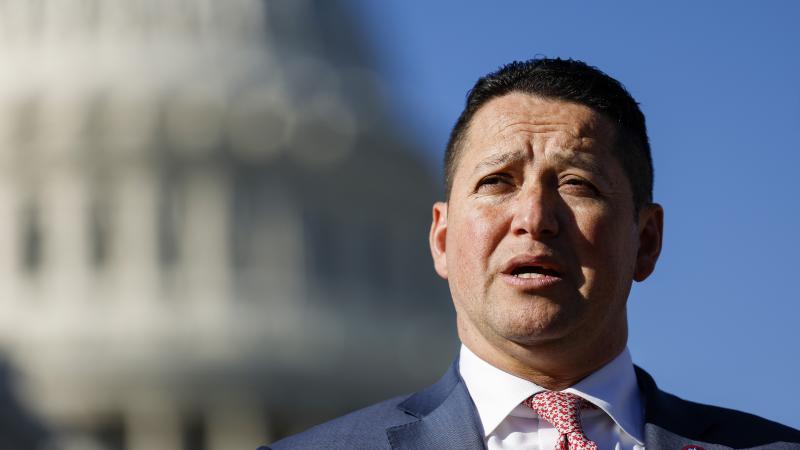Scrutiny of Georgia county ramps up after student murder, Republicans question sanctuary status
The killing of a University of Georgia student last week at the hands of an illegal immigrant has sparked outrage. It has also raised questions over Athens-Clarke County’s illegal immigrant policies, which may violate the spirit of state law.
Athens-Clarke County in Georgia is widely described as a sanctuary city, leading to increased scrutiny from Republicans after an illegal immigrant was accused of killing university student Laken Riley there last week.
Some believe the county may be violating the spirit of a 2009 Georgia law outlawing local jurisdictions from becoming sanctuaries for illegal aliens.
Georgia Rep. Mike Collins, who represents the county in Congress, has been outspoken about the tragedy, laying principle blame on the Biden administration’s border polices, but claiming that Athens-Clark County’s policies are also responsible.
“[If] this border was secure, and Athens not a sanctuary city, Laken Riley would be alive,” Collins posted to X last week. "She would still be talking to her family, hanging out with friends, studying to be a nurse, and working toward serving her community and saving the lives of others."
“Instead, she is dead because the people who took an oath to preserve our Constitution and faithfully execute our laws refuse to do so because they think it benefits them politically,” he added.
Law enforcement arrested Jose Ibarra, an illegal alien from Venezuela, in connection with the kidnapping and murder of the 22-year old University of Georgia student Laken Riley. According to a friend who called the police, Riley had gone out for a run. She was later found near a lake on campus with signs of sustaining blunt-force trauma.
Though a Georgia law first passed in 2009 outlaws local governments in the state from enacting official sanctuary city policies, jurisdictions like Athens-Clarke County have been able to circumvent the spirit of the law in their discretionary law enforcement policies and non-binding county board resolutions.
"You know, and I don't care what the mayor is sitting there saying, just because you say, we're not a sanctuary city, and you're acting like one, and you're on the list for sanctuary cities, you're pretty much a sanctuary city," Collins told the "Just the News, No Noise" TV show Tuesday night.
Athens-Clarke County did not answer questions from Just the News about the county’s sanctuary status. Instead, a spokesperson for the office said that the County Mayor will hold a media conference Wednesday at 9:00 AM to address “community safety initiatives” and the county’s “status related to immigration.”
Rep. Marjorie Taylor Greene, another Georgia congresswoman, decried the tragedy as a result of the unsecured border and soft on crime prosecutors and local governments in the state. Greene also took aim at fellow Republicans in the Georgia state government.
“And you know, here in Georgia, I've gotten really tired of watching my Georgia Republicans here and in our state, pointing the finger at the Biden administration. When in the state of Georgia, we have a Republican governor. We have a Republican state legislator, and we have a Republican attorney general,” Greene told the John Solomon Reports podcast on Tuesday.
“And the fact that they passed a law years ago that we do not have sanctuary cities here in the state of Georgia. But yet at the same time, these same Republicans have turned their head and ignored the fact that Democrat-run cities like Athens and the city of Atlanta, do harbor illegal aliens, they choose to not prosecute them,” she continued.
Georgia Gov. Brian Kemp’s office did not respond to an email requesting comment on Tuesday afternoon. In January, the Georgia State House passed legislation aiming to establish a state commission to oversee state prosecutors. The sponsor of the bill described it as an effort to “reinforce the integrity of our legal system” amid nationwide controversy over liberal prosecutors that chose to forgo charges for low-level offenses and tiptoe around enforcing state laws.
According to a Georgia law which was first passed in 2009 and amended in 2022, “No local governing body, whether acting through its governing body or by an initiative, referendum, or any other process, shall enact, adopt, implement, or enforce any sanctuary policy.”
The law defines a “sanctuary policy” as “any regulation, rule, policy, or practice adopted by a local governing body which prohibits or restricts local officials or employees from communicating or cooperating with federal officials or law enforcement officers with regard to reporting immigration status information while such local official or employee is acting within the scope of his or her official duties.”
In comments to Fox 5 Atlanta, Athens-Clarke County Mayor Kelly Girtz claimed her jurisdiction is not a sanctuary city and that it is in compliance with state law banning such policies and actions, despite criticisms from Republicans.
Yet, in August 2019, Athens-Clarke County passed a resolution in “Support of Athens Immigrant, Undocumented, and Latinx Community” which signaled its support for illegal immigrants in the community who were under “threats” from agencies like Immigration and Customs Enforcement (ICE).
“Whereas, our immigrant and undocumented neighbors, especially those of Latinx heritage, face daily fears and threats from individuals and institutions such as ICE,” the resolution reads.
“[It] is necessary that families and loved ones remain together and that all people, including those without documentation, feel welcome and comfortable interacting with local law enforcement, their local government, and all services provided by such,” it continued.
In light of these factors, the Athens-Clarke County Unified Government resolved that the local government “is welcoming to people from all lands and backgrounds and strives to foster a community where individuals and families of all statuses feel safe, are able to prosper, and can breathe free,” the resolution concluded.
In addition to the resolution, county officials, including the Athens-Clarke Sheriff’s office has implemented policies that may undermine any ICE enforcement efforts. In April 2018, the sheriff reversed a policy requiring illegal immigrants to be held in custody for 48 hours after criminal charges were filed, which complied with ICE requests from the Trump Administration.
This appears to be the current office policy, according to documentation provided to Fox 5 Atlanta. According to the outlet, the current policy requires that any “detainer”—a request to detain the individual—made from ICE, must be accompanied by a federal warrant or court order in order for the sheriff’s office to comply. Otherwise, the sheriff’s office will release the offender before the time period has elapsed.
Rep. Collins believes this policy is partly to blame. "You know, this, this not turning these people into ICE, and retaining them for 48 hours, would have been all that we needed to apprehend and keep this guy behind jail before he did what he did," Collins told the "Just the News, No Noise" TV show.
The Georgia district attorney which covers Athens-Clarke County also implemented new policies when she took office in 2021 to provide favorable treatment to illegal immigrant defendants in her jurisdictions.
In a policy memo newly elected DA Deborah Gonzalez released shortly after taking office, new charging guidelines were outlined, which established that the office would “take into account collateral consequences to undocumented defendants.” One such consequence often highlighted by pro-sanctuary city advocates is deportation of illegal immigrants who are charged with crimes in the United States.
On Tuesday, House Judiciary Chairman Jim Jordan and his colleague Rep. Tom McClintock sent a letter to Department of Homeland Security Secretary Alejandro Mayorkas seeking information about Jose Ibarra.
The federal representatives wrote the letter to request information to identify “vulnerabilities” in the U.S. immigration system after reports that Ibarra was released into the interior of the United States after arriving illegally in 2022. Ibarra was subsequently arrested in August 2023 in New York City and charged him with a crime, which included a motor vehicle license violation. It appears he was not deported after this arrest.














